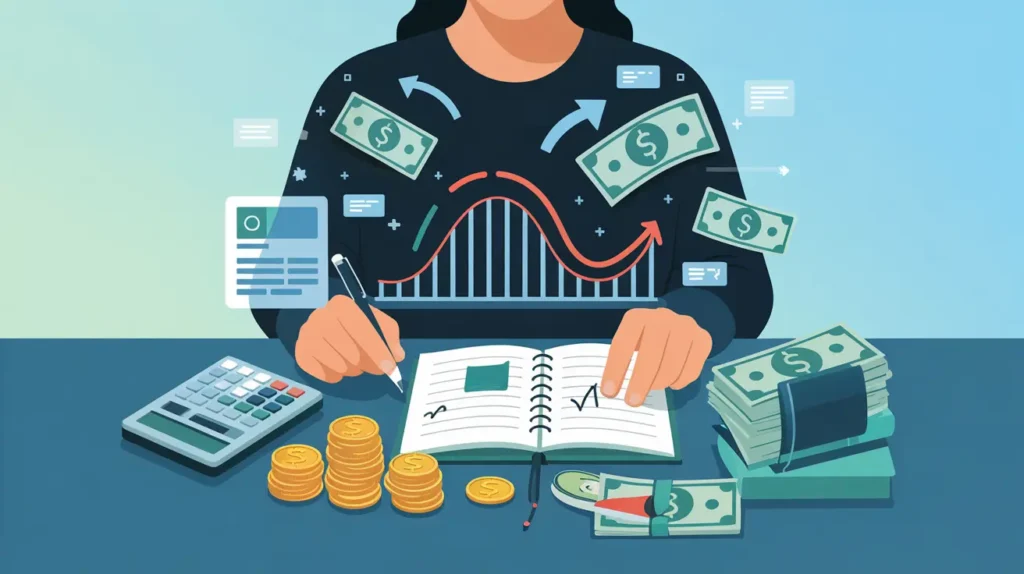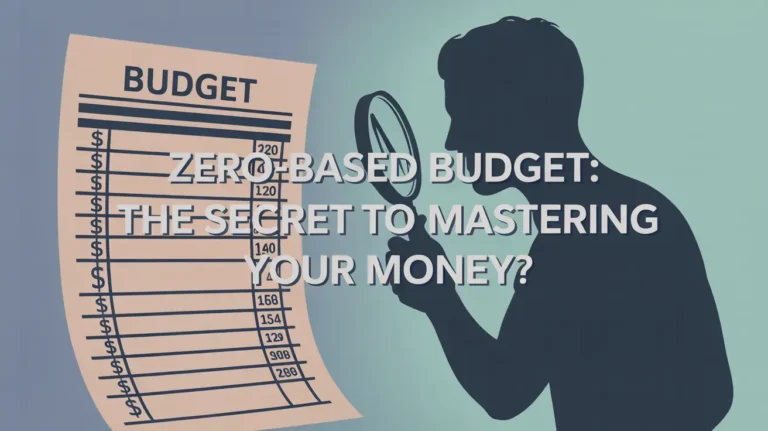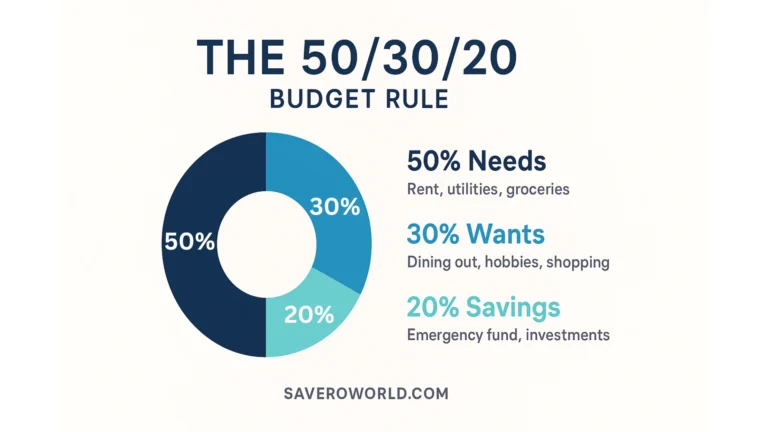Budget Irregular Income: Complete Step-by-Step Guide

Do you ever have a month where you feel rich, and then the very next month you’re stressed about how to pay rent? That’s the reality of living on irregular income. Some months you earn more than enough, and other months you barely scrape by. If you’re freelancing, driving Uber, running a shop, or working on commission, this rollercoaster probably feels familiar.
I understand how exhausting that can be. When your income changes all the time, it feels like your money controls you instead of the other way around. But here’s the truth: you don’t need a steady paycheck to feel steady. What you need is a plan that works with your ups and downs instead of against them.
That’s exactly what we’ll cover here. In this guide, I’ll explain step by step how to budget irregular income so you can feel calm and in control, no matter what your paycheck looks like this month.
What Does Budgeting Irregular Income Mean?
Budgeting irregular income simply means making a plan when your income isn’t the same every month. Unlike salaried employees, you don’t know exactly what you’ll bring home. One month might be amazing, the next month might be slow.
This unpredictability makes traditional budgets tricky. If you set your budget based on a high month, you’ll overspend in a low month. If you try to “guess” every time, you’ll feel stressed and confused.
Instead, irregular income budgeting uses one powerful rule: plan your budget around your lowest month of income. That way, you know for sure your essentials will always be covered. Then, when you earn more than that baseline, you give those extra dollars jobs — like savings, debt repayment, or a buffer for the future.
It’s like creating your own steady paycheck out of an unsteady one.
Why Is Budgeting Irregular Income So Hard?

Let’s be real: the numbers aren’t the hardest part — the feelings are. When you earn more than expected, you feel confident and relaxed. But when you earn less, you feel anxious and defeated. This constant up-and-down cycle wears you out.
Most people also try to force a “regular paycheck” budget onto an irregular income, and it just doesn’t work. You’re trying to fit into a system designed for someone else. That’s why you may have tried budgeting before and thought, “I’m just bad with money.”
But you’re not bad with money — you just need a system that fits your reality. Once you switch to an irregular income plan, you’ll finally feel steady, even if your income isn’t.
How Do You Budget When You Have an Irregular Income?
This is the big question most people ask — and the good news is that the process is simple once you understand it. The secret isn’t to chase a “perfect number.” The secret is to build a system that protects you in low months and uses high months wisely.
Here’s how to do it, step by step:
Step 1: Find Your Baseline (Your Lowest Month)
Look back at your income for the past 6–12 months. Find the lowest month you had. That number is your baseline — your “safe number.”
👉 Example: If your income ranged from $2,200 to $4,800, then $2,200 is your baseline.
Why is this important? Because if you build your budget using your lowest income, you’ll never be surprised. Even in your worst month, your essentials are covered. High months become bonuses instead of creating pressure.
It may feel limiting to use your lowest month, but in reality it creates peace of mind. You’ll stop wondering, “What if I don’t earn enough next month?” because your budget already accounts for that possibility.
Step 2: Cover Essentials First
Now that you know your baseline, start with your essentials — the bills you can’t skip. These include:
- Rent or mortgage
- Utilities (electricity, water, internet)
- Groceries
- Transportation (gas, car payment, public transit)
- Minimum debt payments
Make sure all of these fit inside your baseline income. If they don’t, it’s time to make adjustments — cutting unnecessary subscriptions, reducing eating out, or even negotiating lower bills where possible.
By covering essentials first, you remove most of your financial anxiety. You’ll know that no matter what happens, the roof over your head and your basic needs are secure.
Step 3: Build a Buffer Fund
A buffer fund is your safety net. It smooths out the highs and lows of irregular income. In months when you earn more than your baseline, you put the extra into your buffer. In months when you earn less, you pull from the buffer to cover the gap.
Think of it like an “income smoother.” Over time, your buffer can grow big enough to cover one or two months of expenses — giving you breathing room.
👉 Example: Your baseline is $2,200. In a high month, you earn $3,500. You spend $2,200 on essentials and save $1,300 into your buffer. Next month, if you only earn $2,000, you can use $200 from your buffer to stay on track.
Even starting small makes a huge difference. A $500 buffer can mean the difference between calm and panic in a low month.
Step 4: Use a Zero-Based Budget
Once your essentials and buffer are planned, use a zero-based budget. This system makes sure every dollar has a job — whether it’s for bills, savings, debt, or fun. Nothing is left floating.
With irregular income, this looks like:
- Plan your budget using your baseline (lowest month).
- When you earn more than that, assign the extra right away. Don’t let it sit unplanned.
This prevents the “I’ll just spend a little more because I have extra” trap. Instead, you’ll feel in control and purposeful.
👉 Want a deeper dive? See our full guide on the Zero Based Budget.
Step 5: Create Sinking Funds for Irregular Expenses
Irregular income isn’t your only challenge — life itself has irregular expenses. Birthdays, holidays, car repairs, or medical bills can wreck your budget if you’re not prepared.
That’s where sinking funds come in. A sinking fund is a small amount you save each month toward a known but irregular cost.
👉 Example: If you expect $600 in car repairs per year, set aside $50 each month. When the repair happens, you won’t panic — the money will already be waiting.
Sinking funds keep you from using credit cards or dipping into your buffer for predictable expenses.
Step 6: Separate Business and Personal Accounts (If Self-Employed)
If you freelance or run a small business, separating accounts is a must. Put all your income into a business account. Then “pay yourself” your baseline into your personal account each month.
This creates the feeling of a regular paycheck, even if your business income is all over the place. It also makes taxes easier and gives you clarity about your real spending money.
Step 7: Track Weekly
Irregular income requires more attention than regular pay. That’s why weekly check-ins are key.
Every week, look at your spending. Did you overspend on groceries? Adjust from entertainment. Did you earn more than expected? Decide where that money goes — buffer, debt, savings, or sinking funds.
Checking weekly keeps you proactive. You won’t be surprised at the end of the month because you’re making small adjustments along the way.
Checking weekly keeps you proactive. You won’t be surprised at the end of the month because you’re making small adjustments along the way.
Apps like YNAB, EveryDollar, and Mint can make this process easier by syncing with your accounts.
What Is an Example of an Irregular Income?
Irregular income shows up in many different careers:
- Freelancers like writers, designers, or developers who get paid per project.
- Gig workers driving for Uber, delivering for DoorDash, or doing short-term jobs.
- Commission workers such as real estate agents or sales reps.
- Small business owners whose income depends on seasonal demand.
👉 Example: A real estate agent earns $8,000 in December and $0 in January. If they save $4,000 in December, they can pay themselves $4,000 both months — creating balance where none existed before.
Your income may be irregular, but your budget doesn’t have to be.
What Is True About Budgeting With an Irregular Income?
There are a few key truths to remember:
- You can’t control your income, but you can control your plan. Some months will be high, others low. But the system you build gives you consistency.
- Buffers and sinking funds create stability. Without them, you’ll always feel anxious. With them, you feel calm even when income is unpredictable.
- Lifestyle creep is dangerous. Just because you earn more per month doesn’t mean you should raise your spending. Protect your buffer and goals first.
👉 Example: A freelancer earns $5,000 in May and $2,000 in June. Without a plan, the $5,000 disappears quickly. With a plan, $2,500 goes to essentials, $1,500 to a buffer, and $1,000 to debt. In June, the buffer fills the gap — no panic.
How to Budget for a Non-Recurring Income
Non-recurring income is money you don’t get often — like a tax refund, bonus, or one-off freelance gig. It feels like “free money,” but if you don’t plan, it disappears fast.
Here’s how to handle it:
- Pause before spending. Take a day or two before deciding what to do.
- Cover essentials or debt. If you’re behind, fix that first.
- Add to your buffer or emergency fund. This is your chance to strengthen your safety net.
- Invest in goals. Use some of the money for savings, travel, or a big purchase you’ve been planning.
- Enjoy a little. Spend 5–10% guilt-free on something fun.
👉 Example: You get a $2,000 tax refund. You save $1,000 in your buffer, put $700 on debt, and use $300 for fun. You enjoy yourself while also building a safer future.
Common Mistakes to Avoid
- Budgeting based on your best month. Always plan with your lowest.
- Forgetting taxes. Save 20–30% if you’re self-employed.
- Spending all your extra income. Assign it with a zero-based budget.
- Ignoring stress. A buffer fund isn’t just money — it’s peace of mind.
👉 For more ideas, check out our guide on Budgeting Hacks.
Conclusion
Living with irregular income can feel like a rollercoaster — exciting one month, terrifying the next. But with the right plan, you can smooth the ride.
By budgeting with your lowest month, covering essentials first, building a buffer, and preparing for non-recurring income, you create stability where there used to be chaos.
Remember: you don’t need a steady paycheck to feel steady. You just need steady rules.






